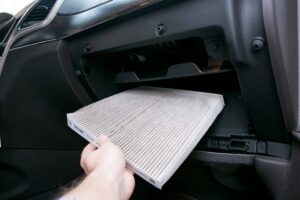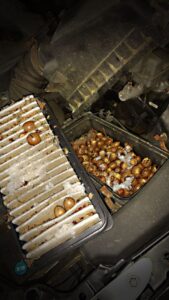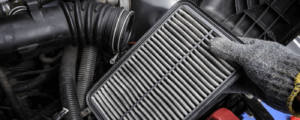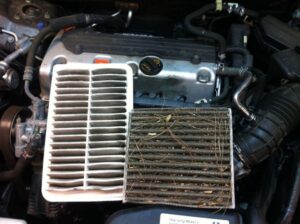In last week’s blog we decoded the common misconception between Wheel alignments & Tire balancing. In this week’s blog, we’re turning our attention to cabin air filters and engine air filters. Just like our lungs filter the air we breathe, these filters ensure the air entering your vehicle and engine is clean and free from contaminants. Let’s explore the differences between these filters and their crucial roles in keeping your car breathing easy.
What Is a Cabin Air Filter?
A cabin air filter is responsible for cleaning the air that enters the interior/cabin of your vehicle through the heating, ventilation, and air conditioning (HVAC) system. It traps dust, pollen, pollutants, and odors, ensuring you breathe clean air while driving. The cabin air filter improves the air quality you breathe. It also protects your A/C system from debris, keeps the system running efficiently and prolongs lifespan.

When Should I Replace My Cabin Air Filter?
The general rule of thumb we prescribe is to change your cabin filter every 15k miles. You can also follow your manufacturers service schedule, most manufacturer’s recommend a cab air filter replacement every 15k miles. Depending on where you live and the environment in which you drive this 15k value will change. For example, if you live on a dirt road you may have to change your cabin air filter more frequently due to the excess dirt being filtered. Critters like to invade your air filters as well, featured in our image below.

What is an Engine Air Filter?
An engine air filter cleans the air that enters the engine’s combustion chambers. It removes dust, dirt, and debris from the air intake, preventing engine damage and assisting in maintaining optimal performance. The engine air filter plays a crucial role in protecting the engine from harmful contaminants, which can cause premature wear and decrease fuel efficiency. A clean air filter also ensures proper air-to-fuel ratio, leading to smoother operation and improved engine longevity.

When Should I Replace My Engine Air Filter?
In general, we would recommend following your manufacturers service schedule. A common service schedule for engine air filters would be every 30k – 45k. Just like cabin air filters, depending on the environment you drive, you may need to get your engine filter replaced sooner if you live on a dirt road or an area that has more dirt and dust then a city for example.

Determining whether your car needs a cabin air filter or an engine air filter depends on your service schedule and the symptoms you’re experiencing. If you notice reduced airflow, strange odors, or increased allergies while driving, it may be time to replace the cabin air filter. Conversely, if you observe decreased engine performance, reduced fuel efficiency, or unusual engine noises, the engine air filter may need attention.
Warning Signs to Look Out For:
- Reduced airflow from the vents
- Unpleasant odors inside the cabin
- Increased allergies or respiratory issues
- Engine misfires or hesitations
- Decreased fuel efficiency
- Unusual engine noises, such as wheezing or rattling
Cabin air filters and engine air filters are essential components of your vehicle’s respiratory system, ensuring both you and your engine breathe clean air. If you have any questions or concerns, we recommend bringing your vehicle to a trusted professional or visit one of our shops and we can inspect your filters for you!
Happy Driving!
Thanks for the information, it was a quick and easy read.
Thanks for the reminder. I know I need to change the cabin filter because my car has more dust than usual and I am wheezing. Usually can do this myself. The engine air filter is not so easy. Question- I only have 11,037 miles now but got the car a little over 2 years ago. Just drive about 40 miles a week. Should I have the engine filter changed anyway even though the miles are not high or just have you check it for me?